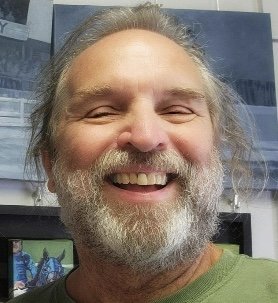Rick Barr
A question was asked the other day: “What training made the most impact on shifting your career?” What a great question!
It was an easy, immediate answer for me.
I came to the mental health world from the church world. For the unaware, church world typically has similar systems across denominations. Here’s how the system works: A few people speak with microphones from an elevated stage, indicating not so subtly they have achieved higher consciousness. This is never said out loud, only implied. Those people (me and my peers), would tell those seated below what they needed to hear and how they needed to live. The messages were didactic and absolute. And if you were in the pews, you could either join in or get prayed for due to a weak faith.
So when I came to the mental health world, church world was my preface. I didn’t have an elevated stage, but I did have a group of people who were obviously in need of guidance. That was my mindset, anyway.
It didn’t help that mindset that I wound up in an inpatient facility working with adolescents who were in the hospital for substance use and mental health issues. They REALLY needed guidance. So I fell into a familiar role: I knew a lot (I had the badge and key to prove it). They knew so little that they couldn’t even be trusted with shoestrings. That’s not hyperbole. So the best thing for everyone involved was if the patient would just shut up and listened intently to the group leader (me!) and did what they (I!) said. After all, we were giving them pearls of wisdom.
I’ll go ahead and admit this, but I don’t want to: On more than one occasion you might have heard me say in group: “You might want to pay attention to this part as if your life depended on it, because it does!” It makes my ass itch that I used to say that. And I didn’t want to tell you, but it summarizes so succinctly what I thought back then. I have the keys to the kingdom and you’re locked outside. By the way, no, I don’t feel better for “getting that off my chest.”
That was the model for a few years. The patient was sick and we had the cure. The only problem with that model was the patient, who was infinitely smarter than we gave them credit for, ended up just pretending to be well. Until they were discharged. Then they resumed previous behaviors.
Around that time a man I didn’t know named Dr. Robert Schwebel had developed a curriculum for adolescent substance use and that program got picked up in a study of a larger program. This post isn’t about him, so I’ll just sum up: He’s basically Yoda and could levitate if he wanted to.
Dr. Schwebel’s program, Seven Challenges, ended up being very effective. Actually, it outpaced the program that paid for the study. So facilities across America started using this program with their adolescent population. Our facility was one of those.
Seven Challenges was a radical departure from what we were doing and how we were doing it. In fact, during the transition, we lost some staff over the philosophical differences between the two programs. Their program invited discussion about what the patient liked about drugs (we discouraged it). Their program insisted on the autonomy of the patient (we reminded the patient they couldn’t be trusted with shoestrings). It was based on sound counseling principles, but those principles had been discarded when working with the adolescent population, because, holy shit, those kids needed saving!
Seven Challenges was a serious program. It wasn’t just another lesson plan. So in order to maintain the fidelity of the program, you had to buy a license to use it, and you had to be trained to use it. So we scheduled our Initial Training at our facility. Our staff set aside a couple of days for this training and Seven Challenges said they were sending their trainer to us.
That was the day I first met Rick Barr.
We’re all gathered in the training room and in walks this guy that looks a little lost. He had long hair and a wrinkle or two on his clothes, no doubt the result of a well used travel bag. And then he started asking questions. I was unfamiliar with the idea of training by asking questions. My view of training, which should be of no surprise to you if you’ve been following along, was a person who knew a lot was supposed to talk a lot to the people who didn’t know a lot. But this was different. Rick asked a lot of questions. And he was having fun doing it. He was having so much fun that I wondered if he was OK. Maybe sleep deprived? Maybe a little high? Maybe? As it turns out, it was just Rick being Rick.
What Rick did for me over the next two days was to dismantle about two decades of maladaptive beliefs in me. But he didn’t rip them away from me. He showed them to me and asked if I was happy with them. He just held up a gentle mirror up for me to see what I had been doing and how it had been working. And he waited for me to get it. If you’re in our field, do you see the beauty of that? If Rick told me what to do or think, I might do that while Rick was in front of me. But if he used a little patience and waited until I got it, when he left, I still had it.
The thing that’s infectious about Rick is his passion. I don’t care if were talking about football, food, God, or treatment. Rick is Fired Up about it! He’s there for it! It’s not that fake excitement you see in some people. I’ve seen him down. I’ve seen him tired. He’s there for that too. I don’t guess I’ve ever known anyone who was there for so much of life. When he was done with it, whether it was an order of ribs or the inner sanctum of a closed off adolescent, there just wasn’t any meat left on that bone.
That training set me on a path that instilled some things that are still with me today: Don’t impose your values on the client. Don’t try to take the client where they don’t want to go. There’s no such thing as a resistant client (that’s just an out of sync therapist). Advocate and align with the client, don’t try to fix them. I could go on and on, but you get the picture.
That training was so impactful I ended up working as a national trainer for Seven Challenges for a few years and Rick ended up being a dear friend and guide for me. We don’t get to see one another very often now, but when we do we meet for a meal time stops. I don’t think I’ve had meal with him that’s lasted under two hours. I don’t schedule anything after a meal with Rick. I always leave with a full stomach and spirit. I know you’ve all heard about active listening. I bet you’ve even been to a training on active listening. But you’ve never experienced active listening if Rick has never listened to you. For him, it’s a contact sport.
The other day I was wrapping up a first session with a client. I asked him, “So how did this first session feel to you?”
He paused a second and said, “It feels like we’re getting ready to go on a trip together. And we’re both looking forward to it.”
Rick Barr taught me that.

